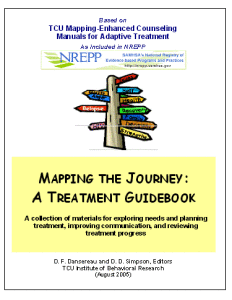
About this intervention
A collection of materials for exploring needs and planning treatment, improving communication, and reviewing treatment progress.
Sections in this intervention include:
- Introduction and Overview to Mapping
- “Mapping Guides”
- Exploring Self Maps: These maps can help a person better understand their strengths and weaknesses, and how they can be used in a positive way. The maps will also help a person to develop a more accurate level of self esteem.
- Social Improvement Maps: These maps can help a person better understand and relate to others.
- Decision Making Maps: These maps can help a person think through an important decision.
- Taking Control Maps: These maps can help a person cope with “LEEPS” (Life, Events, Emotions, Problems, and Successes).
- Monitoring Progress Maps: These maps are designed as a guide to help clients understand, evaluate, and explain progress across key stages of change, as represented in the TCU Treatment Process Model. They also are tools for planning therapeutic activities that will sustain or increase future progress.
- Relapse and Disease Maps: These maps will help a person understand and manage relapse and serious diseases.
- General Planning Maps: To help a person examine a goal and create an action plan. It is similar to Care Planning but can be used with any goal.
- Free Mapping: Use this Free Map Guide to create maps on important thoughts, feelings, and actions. These Free Maps can be used by themselves or together with any of the Mapping Guides.
- Sample Case Study of Maps for “Chris”: The goal of this case study is to give a simple example for how mapping tools can be used during counseling.
- Appendix on Mapping Research
- References
Recommended Citation: Bartholomew, N. G., Dansereau, D. F., & Simpson, D. D. (2006). Mapping the journey: A treatment guidebook. Fort Worth: Texas Christian University, Institute of Behavioral Research. Available: the IBR Web site: www.ibr.tcu.edu